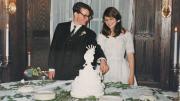How is it that a famous liberal-arts center like Harvard, home to what is arguably the world's first computer, could also be called the birthplace of the world's most successful software company? Are we sure we're not talking about MIT?
At the dedication on October 12 of Maxwell Dworkin, Harvard's brand-new 100,000-square-foot computer sciences and electrical engineering building, there was ample time and brainpower assembled to contemplate these questions, and to pose others about the future of these disciplines at Harvard. Microsoft president Steve Ballmer '77 told the story of how, on that very spot, a former student wrote code for the software that became Microsoft's first product. The student was his friend and classmate William H. Gates III; together they funded the construction of the building. "We want Harvard to have absolutely the greatest computer science and electrical engineering department in the country," said Ballmer, who, as he explained how they had come to name the building for their mothers, Mary Maxwell Gates and Beatrice Dworkin Ballmer, was momentarily overcome with emotion.
William Gates Sr. also spoke, recalling that his wife, "a prominent civic leader, and an astute businesswoman who possessed and emanated a cheery and very optimistic persona"--"was so well-known that for a long time I was regularly identified as Mary Gates's husband. That did end, as I gradually became known as Bill Gates's dad."
"One of our great concerns, and Mary's in particular, was that as [Bill's] business absorbed more and more of his time, [he] would never graduate from this place," the senior Gates continued. (He didn't.) "As we stand here today, that concern is clearly unwarranted. I would say that this event settles beyond doubt that this institution was central to our son's development. And it is the perfect icon for a student's recognition of the importance of his school and his love of a wonderful mother."
In a panel session that was part of the day's dedication, Ben Wegbreit, Ph. D. '70, a former faculty member and now the chairman of E.piphany Inc., spoke about the appeal of a "tantalizingly incomplete" programming language as a metaphor for what moves the search for knowledge forward. The work of universities and entrepreneurs is not teaching what is known, but rather "teaching into the unknown," said Wegbreit. The key is teaching students to ask the right questions. Harvard's students, he said, are "intellectually awesome and personally wonderful," fully capable of wandering into that unknown.
Wegbreit's explanation for Harvard's success in an area for which it seldom receives much attention was wholly credible. But President Neil L. Rudenstine identified another key ingredient in the creation of Maxwell Dworkin, and the day's defining element: "This has been a day of families," he said, "and these families remind us that great institutions are created and nurtured and cared for and kept going...by people with strong feelings, strong convictions, loyalties, ties, and affections. Harvard in this sense is a deeply human enterprise and institution."





